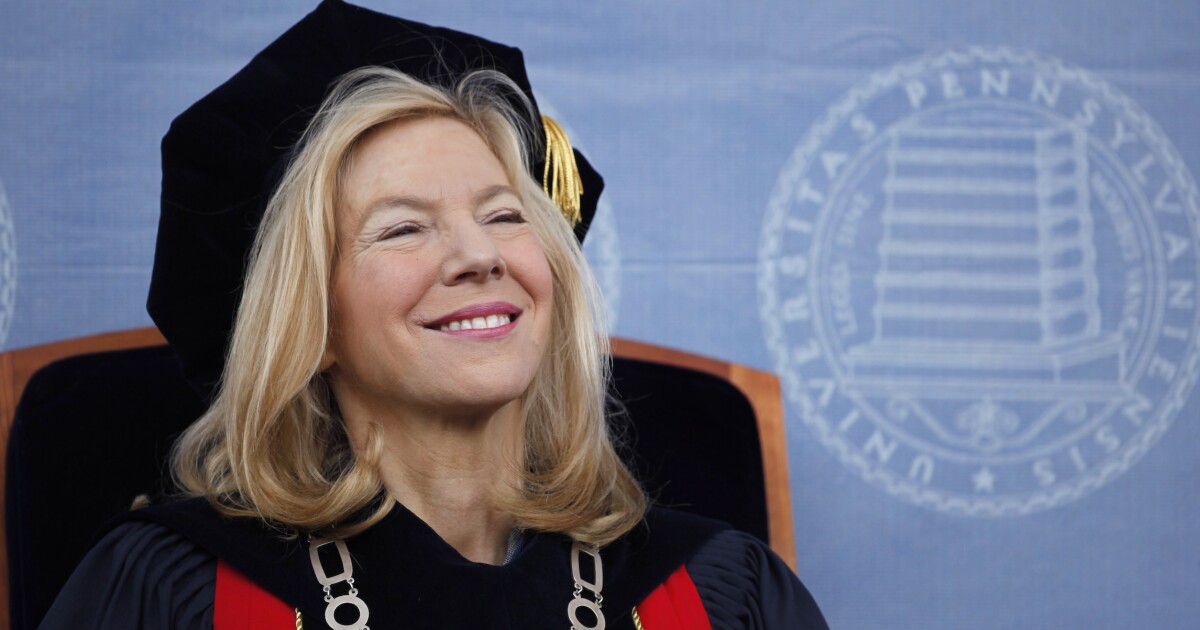

President Joe Biden‘s ambassador to Germany is attracting controversy again, this time over payments she received before leaving her previous job.
Amy Gutmann served as president of the University of Pennsylvania for 18 years before becoming ambassador to Germany in February 2022. She received two substantial sums from the university before leaving the gig.
SENATE CONSIDERS MOVING SPENDING BILLS FORWARD, SETTING UP FIGHT WITH HOUSE GOP
Gutmann got a $3.7 million home loan from the Ivy League school in October 2020, with an interest rate of 0.38%, as she was preparing to leave the on-campus president’s house. Biden won the presidential election in November and named her ambassador to Germany in July 2021.
Also, in 2021, Gutmann received $23 million in deferred compensation, which was earned over her 18-year tenure leading the university.
While both payments are legal and were claimed on ethics disclosures, they raise questions about priorities both within higher education and inside the Biden administration.
“Though this situation doesn’t appear to run afoul of any federal ethics laws or the Biden ethics pledge, it’s hard to see it not stirring up quite a tempest in a different administration,” said Michael Chamberlain, director of the right-leaning watchdog group Protect the Public’s Trust. “For one, it certainly looks like another example of how lucrative it is to be associated with Joe Biden.”
Gutmann has served up a number of controversies over the last few years, and Biden has extensive ties to her former employer, UPenn.
In 2017, Gutmann named Biden a professor at the school and he was paid $911,000 over the next three years despite not teaching any classes.
After winning the election, Biden then named Gutmann ambassador to Germany. He also named former UPenn Board of Trustees chair David Cohen ambassador to Canada.
“The American public could be forgiven for thinking this could be part of the fulfillment of the Biden administration’s vow to return to old norms,” Chamberlain said, “like the spoils system in which plush jobs were distributed to those close to those in power.”
Gutmann also played a role in establishing the Washington D.C.-based Penn Biden Center think tank, which attracted significant controversy when classified documents were found there in January. The University of Pennsylvania received at least $100 million in donations from China between the think tank’s opening and 2022.
Regarding the latest controversy, higher education observers note that major payments to university administrators like Gutmann’s are problematic, if not uncommon.
“Do I think it’s unethical? Yes. But I think a lot of compensation packages for presidents at elite institutions are unethical,” said Joni E. Finney, retired director of the Institute for Research on Higher Education at UPenn. “The practice of having these [home] loans even as you’re leaving is fairly common at elite private universities.”
Similarly, Finney thinks the ambassadorships for Gutmann and Cohen raise thorny questions.
“It’s not a good look,” she said. “It’s not as if she had any foreign policy experience, but she’s not the first ambassador to not have foreign policy experience. I just think the practice is not a good sign for higher education because I think it undermines public trust.”
The recent reports about Gutmann’s eight-figure payout and near-zero interest home loan come as the Biden administration attempts to transfer billions of dollars in student loans to taxpayers and is rolling out plans to lower the cost of college.
However, those plans have come under significant scrutiny because they mostly reduce the amount students need to repay rather than the actual costs of attending.
“It’s a plan to reduce the cost of college, not by reducing tuition paid, but by offering students loans and then allowing them not to pay them back,” wrote the Brookings Institution’s Adam Looney.
Any unpaid loans would be added to the national debt.
The State Department referred questions from the Washington Examiner to UPenn and the Education Department. The Education Department referred questions to the White House, which did not respond when contacted.
Former UPenn Board of Trustees chair Scott Bok defended Gutmann’s $23 million payment in comments to the Philadelphia Inquirer, saying it’s due in large part to her long tenure as president and the exponential growth of the school’s endowment during that time.
“Amy was an extraordinary president for Penn,” Bok told the Inquirer. “When you have a really extraordinary performer for a very long period of time, in a period of strong investment returns, yes, it adds up to quite a substantial number.”
Gutmann was widely considered a successful president at the University of Pennsylvania, and the school’s endowment quintupled from $4.1 billion when she arrived to $20.5 billion when she left. And despite the substantial cost of attendance, Gutmann claimed that 80% of undergraduates left UPenn debt-free by the end of her tenure.
CLICK HERE TO READ MORE FROM THE WASHINGTON EXAMINER
But former White House chief ethics lawyer Richard Painter says the payments raise additional questions regarding both the amounts and the timeline.
“If you are the U.S. Ambassador in Germany with a residence paid for by the U.S. government, and you’ve already been paid $23 million in deferred compensation by your previous employer, why do you need a $3.7 million loan to buy a house in Philadelphia?” Painter posted on X, formerly known as Twitter.




